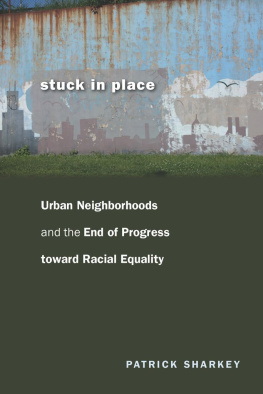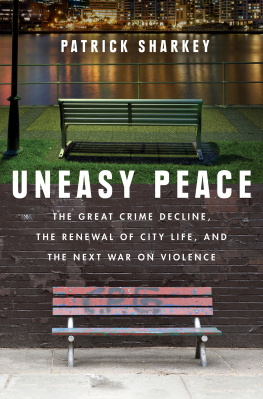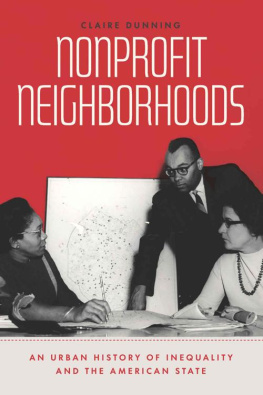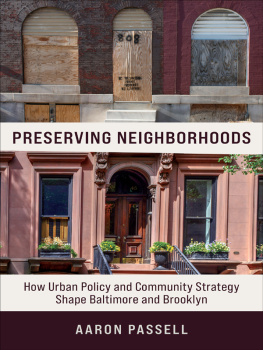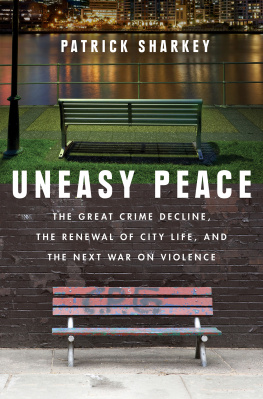Patrick Sharkey - Stuck in Place: Urban Neighborhoods and the End of Progress toward Racial Equality
Here you can read online Patrick Sharkey - Stuck in Place: Urban Neighborhoods and the End of Progress toward Racial Equality full text of the book (entire story) in english for free. Download pdf and epub, get meaning, cover and reviews about this ebook. year: 2013, publisher: The University of Chicago Press, genre: Politics. Description of the work, (preface) as well as reviews are available. Best literature library LitArk.com created for fans of good reading and offers a wide selection of genres:
Romance novel
Science fiction
Adventure
Detective
Science
History
Home and family
Prose
Art
Politics
Computer
Non-fiction
Religion
Business
Children
Humor
Choose a favorite category and find really read worthwhile books. Enjoy immersion in the world of imagination, feel the emotions of the characters or learn something new for yourself, make an fascinating discovery.
- Book:Stuck in Place: Urban Neighborhoods and the End of Progress toward Racial Equality
- Author:
- Publisher:The University of Chicago Press
- Genre:
- Year:2013
- Rating:4 / 5
- Favourites:Add to favourites
- Your mark:
- 80
- 1
- 2
- 3
- 4
- 5
Stuck in Place: Urban Neighborhoods and the End of Progress toward Racial Equality: summary, description and annotation
We offer to read an annotation, description, summary or preface (depends on what the author of the book "Stuck in Place: Urban Neighborhoods and the End of Progress toward Racial Equality" wrote himself). If you haven't found the necessary information about the book — write in the comments, we will try to find it.
Patrick Sharkey: author's other books
Who wrote Stuck in Place: Urban Neighborhoods and the End of Progress toward Racial Equality? Find out the surname, the name of the author of the book and a list of all author's works by series.
Stuck in Place: Urban Neighborhoods and the End of Progress toward Racial Equality — read online for free the complete book (whole text) full work
Below is the text of the book, divided by pages. System saving the place of the last page read, allows you to conveniently read the book "Stuck in Place: Urban Neighborhoods and the End of Progress toward Racial Equality" online for free, without having to search again every time where you left off. Put a bookmark, and you can go to the page where you finished reading at any time.
Font size:
Interval:
Bookmark:
Patrick Sharkey is associate professor of sociology at New York University and an affiliated member of the faculty at the Robert F. Wagner School for Public Service.
The University of Chicago Press, Chicago 60637
The University of Chicago Press, Ltd., London
2013 by The University of Chicago
All rights reserved. Published 2013.
Printed in the United States of America.
20 19 18 17 16 15 14 1 2 3 4 5
ISBN-13: 978-0-226-92424-3 (cloth)
ISBN-13: 978-0-226-92425-0 (paper)
ISBN-13: 978-0-226-92426-7 (e-book)
ISBN-10: 0-226-92424-6 (cloth)
ISBN-10: 0-226-92425-4 (paper)
ISBN-10: 0-226-92426-2 (e-book)
Library of Congress-in-Publication Data
Sharkey, Patrick
Stuck in place : urban neighborhoods and the end of progress toward racial equality / by Patrick Sharkey.
pages ; cm
Includes bibliographical references and index.
ISBN-13: 978-0-226-92424-3 (cloth : alkaline paper)
ISBN-10: 0-226-92424-6 (cloth : alkaline paper)
ISBN-13: 978-0-226-92425-0 (paperback : alkaline paper)
ISBN-10: 0-226-92425-4 (paperback : alkaline paper)
[etc.]
1. African American neighborhoodsSocial aspects. 2. African American neighborhoodsEconomic aspects. 3. Urban African AmericansSocial conditions. 4. Urban African AmericansCivil rights. 5. Discrimination in housingUnited States. 6. EqualityUnited States. I. Title.
E185.86.S514 2012
323.1196 073dc23
2012017909
 This paper meets the requirements of ANSI/NISO Z39.48-1992 (Permanence of Paper).
This paper meets the requirements of ANSI/NISO Z39.48-1992 (Permanence of Paper).
Stuck in Place
Urban Neighborhoods and the End of Progress toward Racial Equality
PATRICK SHARKEY
THE UNIVERSITY OF CHICAGO PRESS
Chicago and London
Contents
Acknowledgments
This project evolved in several stages, and I received a tremendous amount of feedback and support at each stage. The idea for the project emerged when I was in graduate school. While reading the literature on intergenerational economic mobility, I wondered why there was no equivalent research on mobility into and out of poor and affluent neighborhoods across generations. I brought the question to the three faculty members who had given me the most guidance while I was at HarvardRobert Sampson, William Julius Wilson, and Chris Winshipand they all agreed that it was an important gap in the literature. That was the beginning of my dissertation.
Since those initial meetings, these three advisers and mentors have spent much more time responding to my questions, thoughts, and ideas than I deserve. Bill Wilson, whose research on urban poverty inspired me to become a sociologist, provided extensive feedback and pushed me to think more broadly about the implications of my findings for understanding racial inequality in America. Chris Winship spent hours with me discussing tricky methodological issues, conceptual problems, and strategies for refining and improving the analyses I was proposing. I thank them both for their insight, for their advice and suggestions, and for their support throughout graduate school and beyond.
Rob Sampson was the chair of my dissertation committee. When I heard Rob was coming to Harvard, a year after I had arrived to begin grad school, I was thrilledbut I had no idea what an impact he would have on my development as a sociologist. This book, along with all of my work, bears the unmistakable imprint of the countless conversations I have had with Rob discussing ideas, planning courses, puzzling over methods, and interpreting results. Many of the ideas that I put forth in the book are influenced by his research, by the collaborative research we have conducted together, and by the feedback that Rob has given me throughout the development of the manuscript. I am enormously grateful for his mentorship.
Beyond my three advisers, I was lucky enough to be able to interact with a group of thoughtful and incisive people while completing my graduate work. Christopher Jencks and Jim Quane were particularly helpful in guiding my thinking throughout the early stages of the project, and I benefited tremendously from the feedback of other faculty, researchers, and peers during (and after) graduate school, including Corina Graif, David Harding, Joel Horwich, Elisabeth Jacobs, Pam Joshi, Therese Leung, Jal Mehta, Pam Metz, Bikila Ochoa, Jennifer Sykes-McLaughlin, Laura Tach, Chris Wimer, and Scott Winship.
When I finished my doctoral work the strongest parts of the project were the descriptive analyses demonstrating the degree to which neighborhood inequality is passed on across generations. My committee members urged me to make it something more, and it was only after I left grad school that I began to focus primary attention on the consequences of persistent neighborhood inequality. I spent two years in the Robert Wood Johnson Health & Society Scholars Program at Columbia University, pushing this project forward and beginning new lines of research as well. During this period I received excellent advice and feedback on the project from Peter Bearman and Bruce Link, and I was able to draw on the knowledge and the ideas of a wonderful and diverse group of fellow scholars in the program and faculty at Columbia, including jimi adams, Lisa Bates, Maria Glymour, Gina Lovasi, Kathy Neckerman, Ezra Susser, and Julien Teitler. I thank them all.
I began an extended collaboration with my friend Felix Elwert during this time as well. Felix and I spent several years coming up with a strategy that would allow us to identify the effect of living in poor neighborhoods over multiple generations. This collaboration resulted in the analyses that are presented in of the book and also in a stand-alone journal article published in the American Journal of Sociology in 2011. It has been a tremendous experience to work with Felix, and our conversations have been crucial in refining my thinking about the cumulative effects of neighborhood poverty. We benefited also from the thoughts and comments of David Harding, Robert Mare, Steve Raudenbush, and Geoff Wodtke, all of whom provided important feedback on this part of the project.
When I finished my fellowship and began teaching at New York University, the book project was much more expansive than when I left graduate school, but it was not complete. One of the central questions that remained underdeveloped was What next? That is, how can public policies disrupt or confront the problem of multigenerational neighborhood disadvantage? In considering this question, I was heavily influenced by the thoughts of Larry Aber, a colleague and mentor at NYU. Hoping to take advantage of Larrys expertise on issues surrounding neighborhood inequality, child development, and public policy, I asked him if he would be willing to read the concluding chapter of the manuscript. When we met a few weeks later, Larry had read the entire manuscript and had an array of ideas and questions about the overarching argument of the book and about specific sections, paragraphs, and sentences throughout the book. I am extremely grateful to Larry for his willingness to read the book and share his thoughts with me, which were highly influential in the revision process and in the writing of the concluding chapter.
My colleagues in the Sociology Department at NYU also have been remarkably generous in offering their feedback on different pieces of the manuscript. In particular, Richard Arum, Dalton Conley, Steven Lukes, Gerald Marwell, Harvey Molotch, Caroline Persell, Florencia Torche, and Larry Wu have, at various points, provided specific ideas or comments that have stuck in my mind and made their way into the book, in one form or another. Others have provided similarly important comments in informal conversations or during presentations of the research; these others include Xavier de Souza Briggs, Tom Cook, Kathy Edin, Herbert Gans, Michael Hout, and Loic Wacquant. I thank all of these individuals for contributing to the final product.
Next pageFont size:
Interval:
Bookmark:
Similar books «Stuck in Place: Urban Neighborhoods and the End of Progress toward Racial Equality»
Look at similar books to Stuck in Place: Urban Neighborhoods and the End of Progress toward Racial Equality. We have selected literature similar in name and meaning in the hope of providing readers with more options to find new, interesting, not yet read works.
Discussion, reviews of the book Stuck in Place: Urban Neighborhoods and the End of Progress toward Racial Equality and just readers' own opinions. Leave your comments, write what you think about the work, its meaning or the main characters. Specify what exactly you liked and what you didn't like, and why you think so.

